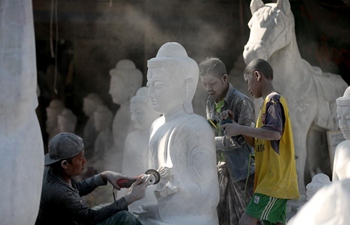NEW DELHI, Dec. 10 (Xinhua) -- The lower house of Indian parliament passed the controversial Citizenship Amendment Bill (CAB) early Tuesday that would grant Indian citizenship to those non-Muslim immigrants, amid noises from the opposition, officials said.
The bill aims at granting citizenship to illegal immigrants belonging to six religions -- Hinduism, Sikhism, Buddhism, Jainsim, Parsi and Christianity from Bangladesh, Afghanistan and Pakistan. However, it has kept out Muslims from applying for the citizenship.
A heated debate was witnessed in the house on Monday for nearly 12 hours, after which the bill was put to vote after midnight in the lower house locally called Lok Sabha.
"After discussions 311 voted in support of the bill and 80 against it," an official said.
The bill was introduced in the parliament by India's federal home minister Amit Shah, who countered the opposition's claim of the bill being "anti-Muslim" in his replies inside the house during the debate.
Shah questioned the Congress party's right to dub the bill as discriminatory, saying it was the very party that "divided India on the grounds of religion" during the 1947 partition.
"Delighted that the Lok Sabha has passed the Citizenship (Amendment) Bill, 2019 after a rich and extensive debate. I thank the various members of parliament (MPs) and parties that supported the bill," Indian Prime Minister Narendra Modi wrote on twitter.
"This bill is in line with India's centuries-old ethos of assimilation and belief in humanitarian values," said Modi, praising Shah for getting the bill passed.
"I would like to specially applaud Home Minister Amit Shah for lucidly explaining all aspects of the Citizenship (Amendment) Bill, 2019. He also gave elaborate answers to the various points raised by respective MPs during the discussion in the Lok Sabha," Modi writes.
Opposition lawmakers criticized the bill as contrary to secular principles enshrined in India's constitution as it excludes Muslims.
A Muslim lawmaker Asaduddin Owaisi created a flutter in the house by tearing a copy of the bill.
Congress party lawmaker Manish Tewari also vehemently opposed the bill.
"The bill is against the constitution, against the spirit of the constitution and against the ideology propounded by Babasaheb Ambedkar," Tewari said.
A bill needs to be ratified by both houses to become a law. Analysts said it was easy for BJP to get the bill passed in the Lok Sabha, because it enjoys a clear majority there. However, in the upper house (Rajya Sabha) BJP does not have enough numbers to ensure its smooth passage.
CAB has already triggered widespread protests in India's northeast, bordering Bangladesh, as locals fear immigrants from across the border would endanger their position.
Through the bill, the Indian government would grant Indian citizenship to those non-Muslim immigrants who had entered the country illegally until Dec. 31, 2014.
BJP government had introduced the bill in its previous tenure and got it passed in the lower house of the parliament. However, it could not introduce it in the upper house due to vehement protests.
The bill lapsed following the dissolution of the previous Lok Sabha.













